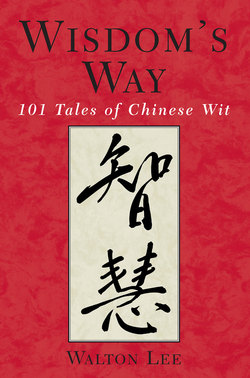Читать книгу Wisdom's Way - Walton C. Lee - Страница 10
На сайте Литреса книга снята с продажи.
CHAPTER THREE Keep It Simple and Clear
ОглавлениеYou Can Have It
Tang Dynasty618 A.D. to 907 A.D.
In the old days, the emperor was the single most powerful person in the entire realm. People treated him almost like a god. For example, when the royal coach passed through the streets there would be a brief curfew. Every resident had to stay at home with doors and windows tightly closed. Pedestrians hid themselves in alleys. Nobody was allowed to look at an emperor’s face. An offender might lose his head. In some dynasties, harbingers were sent ahead to spread fresh yellow earth on the road, so that the emperor’s coach would not touch the mundane and slovenly land.
In daily life, the emperor was surrounded by eunuchs and assistants. To gain the emperor’s trust, which could be turned into influence, they sought ways to flatter him. The following two amusing episodes happened in the early ninth century A.D. A newly-enthroned young emperor named Tang-Wen1 was on his way to a temple to one day honor his ancestors, which was a very important event for the new master. An officer came, knelt before him and reported that two wrestlers, waiting outside of his chamber, were ready to perform.
“What is this all about? Who hired them? I didn’t order any wrestlers and I am in a hurry to attend the ceremony.” the Emperor exclaimed.
“Your Majesty,” answered a eunuch, “it is our tradition….”
“All right, all right, I know what they are getting at.” the emperor impatiently interrupted, with obvious irritation. “Taking advantage of the situation, those two shameless swine expect to receive a handsome reward. Just let them wrestle in the front yard. After they finish, give them some money and let them go.” He then departed without observing the game.
After this unpleasant experience, the ‘tradition’ was never again repeated. The smart emperor’s disdain strongly conveyed a message, which was faithfully complied with by his shrew and observant eunuchs. Consequently, the master would never be accused of being radical.
Another day, while the emperor was watching a cockfight, a eunuch, who was well-known for getting attention and flattering his master, hooted and howled vigorously. Disgusted by this, his master coldly said to him “Well, it seems to me that you love those two cocks very much. I will give them to you if you can just keep your mouth shut.” Profoundly embarrassed, the eunuch dared not to utter another word.
Although history generally labels this emperor as an average ruler, I think he duly demonstrated his sophistication and competence from those two interesting cases. Although the emperor was evidently against the practice of wrestling at that particular moment, he didn’t publicly denounce it; thus evading a direct conflict with his eunuchs, a well-established and powerful special-interest group. Their potential threat must not be underestimated. Numerous historical tragedies show that notorious and power-hungry eunuchs ruthlessly murdered or dethroned emperors at their will.
But to respect his predecessors and avoid future complications, the emperor didn’t openly condemn this faulty tradition, which was probably established in past ages by greedy eunuchs; rather, he cleverly chose to ignore it. Observing this, those wily eunuchs would clandestinely discontinue the practice.
In the second illustration, the emperor understood that the eunuch’s behavior was definitely out of line. If he showed his anger and punished the eunuch, as any simple-minded and short-tempered emperor would do, he would, unnecessarily and erroneously, earn himself a notoriety for harsh treatment. On the other hand, if he ignored him, other eunuchs would consider him weak and feeble-minded and open to flattery. Contemptuously rewarding him with the cocks, the emperor cleverly revealed his disdain for sycophants while at the same appearing generous.
Absent-Minded or Forgiving
Eastern Han Dynasty25 A.D. to 220 A.D.
To snatch absolute power, an ambitious lord or a king would inflate a trivial quarrel with the imperial government as an excuse to go to war, and, after winning several battles, replace a weak emperor. To strengthen this attempt, the conniving lord would make friends with ambitious ministers working in the imperial palace, and acquire important inside information from them. To secure their own future positions, these ambitious ministers would collaborate with the power-hungry lord. But if the rebellion was unsuccessful, many high-ranking officials serving under the emperor would be arrested and beheaded due to their disloyalty. A similar episode occurred in the early first century A.D.
After many bloody battles, a rebellion was totally crushed. In the rebel leader’s headquarters, imperial guards discovered several chests filled with thousands of letters revealing secret imperial information. Many well-known politicians’ names appeared on those envelopes. If revealed to the public, their integrity and loyalty would be at stake. A bloodthirsty political purge was unavoidable. Glancing at them for a few seconds, those soldiers were shocked. Closing the chests and sealing them with official labels, they nervously reported what they had found and presented them to the Emperor Han-Kuan-Wu.2
Receiving those sealed chests, solid evidence of disloyalty, the emperor left them shut and urgently assembled all of his officials in the grand imperial hall. After brief but warm apologies for this unscheduled meeting, the ruler addressed the officials.
“Gentlemen, we all should take our ease and be delighted. We have completely destroyed the rebels. However, by chance, I notice that some of you are long-faced and suffering sleepless nights. At first, I was deeply puzzled and constantly asked myself. ‘How come? What is bothering them? They should be more than happy to share the victory with me.’ Now, I finally know the cause. Here is the cure.”
